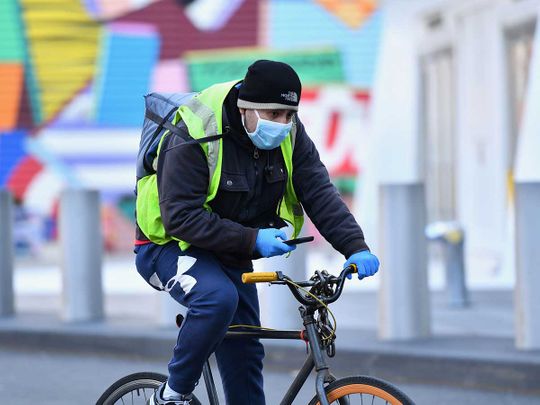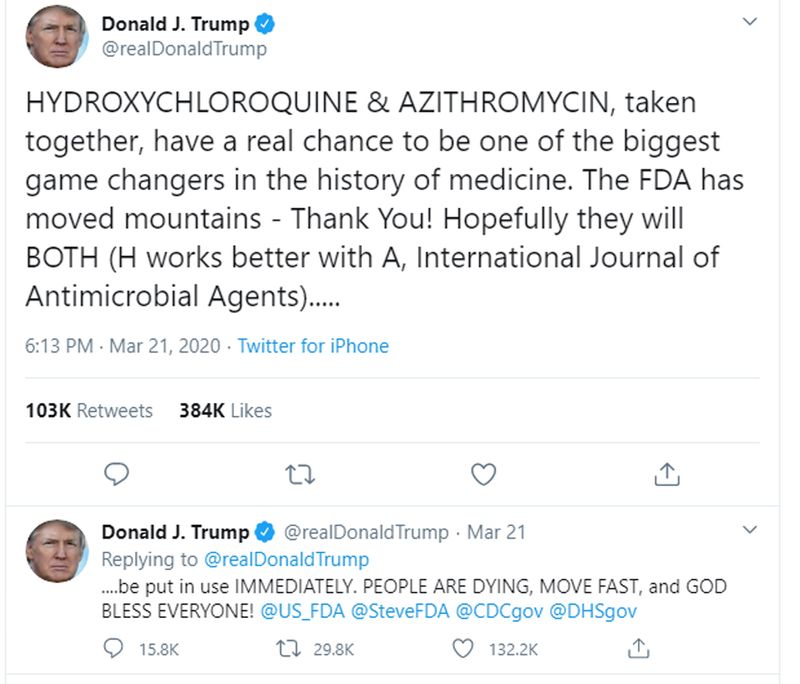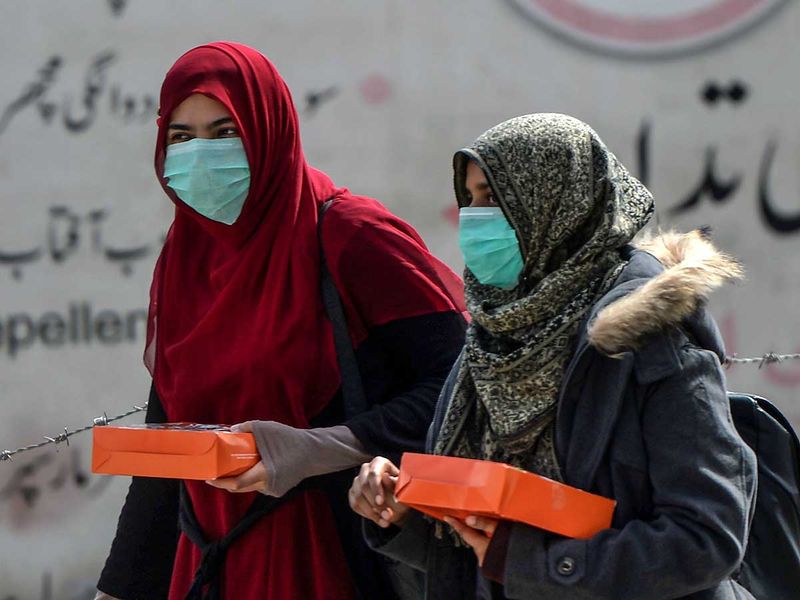
As the new coronavirus that has killed more than 20,000 people causes markets to crash and sets scientists scrambling for a solution, rumours and false claims are fuelling confusion and deepening the economic misery.
A man died in Arizona after self-medicating with chloroquine phospate, just days after a controversial tweet by the US president Donald Trump mentioned two drugs as 'game changers'. AP reported that the man's wife had also ingested the chemical and was hospitalised in critical condition.
The woman told NBC News: "I saw it sitting on the back shelf and thought, 'Hey, isn't that the stuff they're talking about on TV?'"

At a news conference last week, Trump stated that the Food and Drug Administration had just approved the use of an anti-malaria medication called chloroquine to treat patients infected with coronavirus. He did this even after the FDA chief clarified that the drug still needs to be tested for that use, Trump overstated the drug’s potential upside in containing the virus through a tweet on March 21 - touting them as 'game-changers in the history of medicine.
The man and his wife ingested a derivative of chloroquine, chloroquine phospate, which is usually used as an additive to clean fish tanks. The man’s death came as the number of COVID-19 cases in Arizona spiked more than 50 per cent in one day, from 152 on Sunday to 235 on Monday, according to the state Health Department.
The Nigerian government has also issued a warning over the use of chloroquine to treat COVID-19 disease after three people in the country were hospitalised after an overdose of the drug as it caused poisoning. According to a CNN report on Monday, Nigerian authorities have cautioned against using chloroquine for new coronavirus treatment. While chloroquine is no longer used to treat malaria in Africa, some pharmacies still stock it for patients who are resistant to other anti-malaria drugs.
"Given the uncertainty around COVID-19, we understand that people are trying to find new ways to prevent or treat this virus, but self-medicating is not the way to do so" said Dr Daniel Brooks, Banner Poison and Drug Information Center medical director. Brooks urged the medical community to not prescribe chloroquine medication to any non-hospitalized patients.
I am making colloidal silver now. I have asthma and does it really work worried/stressed over virus. Does this help if I take a teaspoon a day. New to this...
Experts say using the drug and its cousin chloroquine to treat COVID-19 isn't backed by enough scientific evidence. However, some regions have started testing the efficacy of hydroxychloroquine on grave cases.
The National Task Force for COVID-19 constituted by the Indian Council of Medical Research (ICMR) on Monday recommended the use of hydroxychloroquine a less toxic derivative of chloroquine -- to treat the COVID-19 disease in high-risk cases albeit with utmost precaution.
On March 26, a 66-year-old man, admitted to a private hospital in Kolkata, tested positive for coronavirus, taking the total number of positive cases in West Bengal to 10. According to hospital sources, the patient is in ICCU and being treated with hydroxy-chloroquine and other medicines prescribed for HIV treatment.

Chloroquine is generally used to treat malaria, lupus and rheumatoid arthritis.
The anti-malarial drug can be administered in France to patients suffering from the severest forms of the coronavirus but only under strict supervision, Health Minister Olivier Veran said on Monday. "The high council recommends not to use this treatment... with the exception of grave cases, hospitalised, on the basis of a decision taken by doctors and under strict surveillance," Veran told reporters.
Some researchers have said chloroquine shows great promise as a treatment, though scientists have agreed that more trials are needed to determine if the drug is really effective and safe.
Other dangerous self medication, 'cures'
From being duped into taking poisonous "cures", to watching businesses crumble and avoiding life-saving medication, people are suffering devastating real-world impacts of a deluge of online virus misinformation.
The effects can be tragic - in Iran, one of the hardest-hit countries, more than 210 people died from drinking toxic alcohol after claims circulated online that it could treat or ward off COVID-19, the official Irna news agency reported.
Dangerous or ineffective and fake "cures"
- Consuming volcanic ash
- Using UV lamps or chlorine disinfectants on the body
- Drinking silver particles in liquid, known as colloidal silver.
- Toxic alcohol (More than 210 people in Iran died trying this)
- Consuming cocaine and bleach-like solutions
- Miracle mineral supplement or MMS which has chlorine dioxide - a bleaching agent
- Drinking water every 15 minutes
Dangerous fake cures debunked by AFP include consuming volcanic ash and fighting infection with UV lamps or chlorine disinfectants, which health authorities say can harm the body if used incorrectly.
Another remedy that "kills the coronavirus", according to misleading social media posts, is drinking silver particles in liquid, known as colloidal silver.
"I am making colloidal silver now. I have asthma and does it really work worried/stressed over virus. Does this help if I take a teaspoon a day. New to this" said a post by a user named Michelle in a public Facebook group, alongside a photo of a jar of water with a metal rod in it.
The side effects of taking colloidal silver can include a bluish-grey skin discoloration and poor absorption of some medicines including antibiotics, according to the US National Institutes of Health.
No, cocaine does NOT protect against #COVID-19
But this has not put some people off. An Australian man who said he regularly buys the concoction told AFP it had "sold out in my town but before the virus, I could always get some".
Cocaine and bleach-like solutions are also among the risky fake cures touted online. "No, cocaine does NOT protect against #COVID-19," the French government tweeted in response.
Businesses selling Chinese goods hit hard
As panic buying leaves supermarket shelves empty around the world, some Indian traders and farmers have had the opposite problem - people shunning their products due to false information.
Retailers in Delhi told AFP they had stocked up on Chinese-made goods such as toy guns, wigs and other colourful accessories ahead of Holi festival earlier this month.
But "misinformation about Chinese products - that they might transmit coronavirus - caused a downfall in the sales of Holi goods. We witnessed a reduction in sales of around 40 percent compared to previous year", said Vipin Nijhawan from the Toy Association of India.
The World Health Organization has said the virus does not last long on inanimate surfaces, so it is unlikely imported goods would remain infectious even if contaminated.
'Can I take my heart meds?'
The rapid spread of information online means that when scientists discuss as-yet unproven theories, anxious patients can take unnecessary risks.
Confusion has been sparked by letters and theoretical papers published in scientific journals about whether some types of heart medication can raise the chance of developing a serious form of COVID-19.
This has prompted health authorities across Europe and America to advise heart patients - already more at-risk for the disease - to continue taking their drugs.
Carolyn Thomas, who runs a blog for women living with heart disease, said dozens of her readers had contacted her for advice after seeing tweets warning about ACE inhibitors and angiotensin receptor blockers.
"Until I get in to see my own cardiologist, I'm still taking my own drugs, even as I wonder if they are increasing my own vulnerability to catching the virus," Thomas, who is self-isolating at home in Canada, told AFP.
"I'm afraid to take them, yet I'm afraid to stop," she said.
Infodemic
"We're not just fighting an epidemic; we're fighting an infodemic. Fake news spreads faster and more easily than this virus and is just as dangerous," said World Health Organization Director-General Tedros Adhanom Ghebreyesus on Feb. 15.
For starters, if someone high up in the government or military was attempting to communicate vital information to American citizens, they probably wouldn't do it with a rambling screenshot from the Notes app. A source in Homeland Security is not trying to get the word out about impending martial law, and there is no "high-ranking military friend in D.C." passing along a tip about the president using the Stafford Act for a nationwide quarantine.
Another hot topic: ibuprofen. The French doctor who originally advised people not to take Tylenol probably meant well, but medical experts around the world say there's no evidence ibuprofen is linked to a higher risk of COVID-19 infection, nor has it been linked to increased complications from the disease.
- Inputs from agencies








